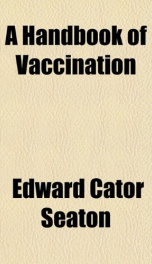a handbook of vaccination

Purchase of this book includes free trial access to www.million-books.com where you can read more than a million books for free. This is an OCR edition with typos. Excerpt from book: CHAPTER IV. OF THE RELATION OF COW-POX AND HORSE-POX TO HUMAN VARIOLA. 25. Jenner-s views on this subjectIt was one of Jenner's fundamental doctrines, that the cow-pox and the horse-pox (or grease, as he at first regarded it) were products of the same virus as produced the smallpox in man. The disease in the horse was considered by him to be the parent disease; that in the cow and in man as derived diseases. The malignancy and peculiarly infectious character of human variola were not, in his view, any essential part of the effects producible by the variolous poison on the human constitution, but were properties at first accidentally super- added, and, when once acquired, capable of propagation. " May it not be reasonably conjectured that the source of the small-pox is morbid matter of a peculiar kind, generated by a disease in the horse, and that accidental circumstances may have again and again arisen, still working new changes upon it, until it has acquired the contagious and maligna-nt form under which we now commonly see it making its devastations among us ?" If man would only go back to the horse or cow, and take his small-pox direct from them, he might have it apart from these unessential malignant characters. Inquiry into the Causes and Effects of the Variolse Vac- cinse, p. 53? And a person having, accidentally or designedly, contracted cow-pox, was held by Jenner to be safe from small-pox, not because he had gone through some peculiar disease which stood in mysterious antagonism to small-pox, but simply because he had actually gone through small-pox itself. So much of these speculations as ascribes the origin of human and vaccine variola to the horse has received less attention probably than it deserved, and has certainly had little acceptance: but the truth...
Info about the book
Author:
Series:
Unknown
ISBN:
1475052952
Rating:
3.5/5 (4)Your rating:
0/5
Languge:
English
Users who have this book
Users who want this book
What readers are saying
What do you think? Write your own comment on this book!
write a commentif you like a handbook of vaccination try:
Other books by this author
Do you want to exchange books? It’s EASY!
Get registered and find other users who want to give their favourite books to good hands!


